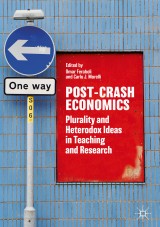Details

Post-Crash Economics
Plurality and Heterodox Ideas in Teaching and Research|
96,29 € |
|
| Verlag: | Palgrave Macmillan |
| Format: | |
| Veröffentl.: | 21.11.2017 |
| ISBN/EAN: | 9783319658551 |
| Sprache: | englisch |
Dieses eBook enthält ein Wasserzeichen.
Beschreibungen
<p>This book demonstrates the continuing relevance of economics for understanding the world, through a restatement of the importance of plurality and heterodox ideas for teaching and research. The Great Financial Crash of 2007–8 gave rise to a widespread critique of economics for its inability to explain the most significant economic event since the 1930s. The current straightjacket of neo-classical undergraduate economic teaching and research hinders students’ understanding of the world they live in. The chapters in this book provide examples to demonstrate the importance of pluralistic and heterodox ideas from across the breadth of economics. The authors’ plurality of approach is indicative of the fact that economics is a much broader discipline than the dominant neo-classical orthodoxy would suggest. This volume provides undergraduate students with a range of alternative ideas and university lecturers with examples whereby the curricula have been broadened to include pluralist and heterodox ideas.</p>
<p>Chapter 1. Introduction: The Financial Crash and Post-Crash Economics<b>.- </b>Chapter 2. Student Reflections and Post-Crash Economics.- Part I. Problems in Business Economics.- Chapter 3. Business Strategy, Economic Crisis and the Theory of the Firm.- Chapter 4. History of Contemporary Economic Thought: Radical Economics, Marxist Economics and Marx’s Economics.- Part II. Problems in Micro Economics.-<b> </b>Chapter 5. Applying Principles of Action Learning in Undergraduate Economics.- Chapter 6. Conceptual Fossils: Why do we Keep Teaching Irrelevant Ideas in First Year Economics?.- Chapter 7. The Present State of Economics: Errors and Omissions Excepted.- Chapter 8. Teaching with Historical Perspectives: The Case of Development Economics.- Part III. Problems in Financial Economics.-<b> </b>Chapter 9. Teaching Reciprocity as the Foundation of Financial Economics.- Chapter 10. A Critical Approach to Teaching Financial Economics.</p>
<div><p><b>Omar Feraboli </b>is Lecturer in Economics at the University of Dundee, UK. His main fields of research are international finance and international trade, in particular applied computable general equilibrium (CGE) models and trade policy issues.</p> <p><b>Carlo J. Morelli</b> is Senior Lecturer in Economics at the University of Dundee, UK, and has published work in economic and business history. His recent work includes studies of economic transformation, the management of decline in the jute industry and the food retailing industry.</p></div>
<p>This book demonstrates the continuing relevance of economics for understanding the world, through a restatement of the importance of plurality and heterodox ideas for teaching and research. The Great Financial Crash of 2007–8 gave rise to a widespread critique of economics for its inability to explain the most significant economic event since the 1930s. The current straightjacket of neo-classical undergraduate economic teaching and research hinders students’ understanding of the world they live in. The chapters in this book provide examples to demonstrate the importance of pluralistic and heterodox ideas from across the breadth of economics. The authors’ plurality of approach is indicative of the fact that economics is a much broader discipline than the dominant neo-classical orthodoxy would suggest. This volume provides undergraduate students with a range of alternative ideas and university lecturers with examples whereby the curricula have been broadened to include pluralist and heterodox ideas.</p><p></p><p> </p><p><b>The quest for a rethinking of the university Economics curriculum has produced a lively and dynamic literature. This book goes further than others by exploring how heterodox approaches would enrich the syllabus not only in micro and macro economics but also in business, development and financial economics. It also considers approaches for engaging students with the Economics discipline. This book is essential for scholars and instructors who advocate a new curriculum if Economics is to be relevant for the real world.</b><b><br/></b></p><p><b></b><b>___Alberto Paloni, University of Glasgow</b> </p><p></p>
Includes student’s own reflections on their studies of economics Provides a unique scholarly focus upon heterodox and pluralistic approaches Develops post-crash approaches to specific fields of economics Identifies pluralistic approaches of relevance to undergraduate economics teaching
<div><p>Includes student’s own reflections on their studies of economics</p><p>Provides a unique scholarly focus upon heterodox and pluralistic approaches</p><p>Develops post-crash approaches to specific fields of economics</p><p>Identifies pluralistic approaches of relevance to undergraduate economics teaching</p></div>
Diese Produkte könnten Sie auch interessieren:

Integration, Growth, and Cohesion in an Enlarged European Union

von: John Bradley, George G. Petrakos, Julia Traistaru

149,79 €

Rethinking Regional Innovation and Change: Path Dependency or Regional Breakthrough

von: Gerhard Fuchs, Philip Shapira

149,79 €














